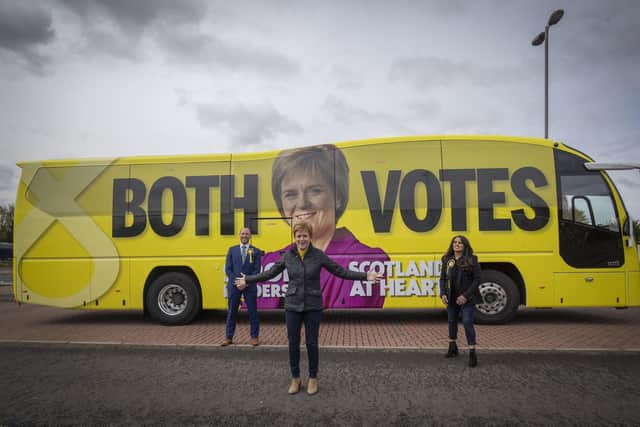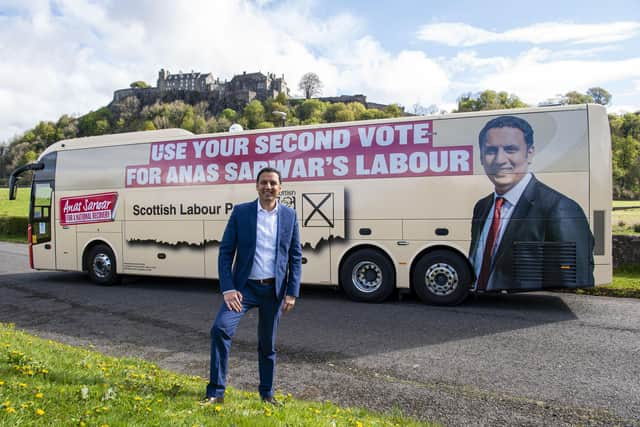Nicola Sturgeon's personality cult may mean she will ultimately face the same fate as Margaret Thatcher – Alastair Stewart
When Thatcher died in 2013, some of the scenes in Scotland were embarrassing. People too young to have lived through her policies were cheering in Glasgow's George Square. It was an apt summation of Scotland's serious cognitive dissonance and preference for pop-culture history as reflected in Rifkind's assessment.
Scottish politics is unusually replete with old ghosts. Winston Churchill is alive and well as a hero or bogeyman (depending on who you ask). But this dodgy cultural memory has bled through and impacts real life. Modern political debate, particularly on social media, is about personalities and pastiche with little patience for actual policies.
Advertisement
Hide AdAdvertisement
Hide AdWith more than a little irony, Nicola Sturgeon now finds herself facing the same fate as Churchill and Thatcher despite, but also because of, her recent election victory.
She's derided and praised with equal force. Her innocence, guilt or competence is contingent on who you ask, seldom the facts. We’ve done away with subtlety – a politicised electorate is a good thing, but a blind one is dangerous.
And the SNP have a problem: Sturgeon is the guardian of independence now. The party made their entire 2021 election campaign about her. Independence is the issue, strong and stable leadership throughout the Covid-19 crisis a justifying support act.
After the Alex Salmond controversy, the SNP demonstrated a remarkable, nay Conservative, ability to cast former leaders aside if it meant saving the agenda. As Conservative writer Robin Harris remarked, no self-respecting Conservative loves the party, it's a means to an end.


And it's true for Sturgeon. Anthropomorphising independence into one person is the worst possible strategy for the party ahead of a second independence referendum. “At least she's not Boris” might be an election-winning strategy, but it's not the basis for independence in itself. The Scottish Conservatives putting Ruth Davidson front and centre was no argument for the Union, either.
When the First Minister appeared before Holyrood’s Salmond inquiry committee, some Scottish Conservatives called on her to resign before she had given evidence. She testified for eight hours and #IstandwithNicola was trending during the proceedings despite legitimate concerns being raised about her government's conduct.
Scottish politics never looked worse that day because it was a loaded dice for supporters and detractors alike. The SNP have made Nicola Sturgeon a figurehead, but have not yet armed her with the specifics of what independence would cost, look like and how long it would take.
And if they repeat the Scottish Parliament election strategy at an independence referendum – it's not the party, it's all about Nicola – it could very well fail. It’s the same mistake that cost Thatcher the leadership. Her policies and disposition jeopardised the Conservatives’ electoral fortunes in the end.


Advertisement
Hide AdAdvertisement
Hide AdThere is no five or ten-year plan for Scotland after independence. The tired excuse that “well, Brexit didn't have that, so why do we need to do the same?” is self-destructive.
The SNP might well pressure Westminster into granting a second vote. Still, it is an arrogant obfuscation to keep kicking the can down the road, assuagingly saying the particulars of independence will be forthcoming. And eventually, one person will get the blame.
Thatcher, after years in power, believed herself infallible. She was defenestrated from within to save the fortunes of her party. The SNP are just as broad a church, if not more, than the Conservatives. It is a fierce party machine with a common cause – and that common cause will shred anyone who gets in the way.
No one is asking what would happen to the SNP, never mind its leader, if they lost an independence vote – again. Jim Sillars even warned the independence movement should set up a new party vehicle (which Salmond has now done).


Fictive kinship is a temporary indulgence at best. 'Maggie' was thrown under a bus by her party. She was followed by the quiet, grey man of John Major. By 1997 he had run out of fresh ideas, and it was the electorate who resoundingly kicked him out.
Sturgeon's popularity and appeal are not the same as support for independence. The conflation is deadly. The two do not necessarily translate, just as support for the SNP did not mean a 'Yes' win in 2014. It is a mistake to think the SNP are the guardians of the independence movement, but it is a bigger mistake to rest the campaign and arguments on the shoulders of one person.
Scots are a reactionary bunch by nature. The more people push, the more we push back. The more politics is made about one person, the more personal, aggressive and unproductive it becomes.
The question really fleshed out in this year’s election is what kind of politics do we want to see going forward? At the moment, it feels at an all-time low for anyone who reads social media comments. Politics should not be only about independence – that cannot be the defining structure in which we all operate.
Advertisement
Hide AdAdvertisement
Hide AdWe are not a presidential system, we need hardworking constituency MSPs, and the new emphasis on 'leaders' is misleading and ultimately self-defeating.
Once there was discord and disagreement, but now there is perpetual vitriol. Post-truth is an irritating cliche, but when everyone metaphorically adopts the Roman legionaries’ testudo formation, they are bound to suffer cognitive dissonance. The risk to the Union or losing the independence vote is the same – no one trusts the other side’s figurehead to tell them the truth. This is the worst possible time for personality cults.
Alastair Stewart is a freelance writer and public affairs consultant. Read more from Alastair at www.agjstewart.com and follow him on Twitter @agjstewart
A message from the Editor:
Thank you for reading this article. We're more reliant on your support than ever as the shift in consumer habits brought about by coronavirus impacts our advertisers.
If you haven't already, please consider supporting our trusted, fact-checked journalism by taking out a digital subscription.
Comments
Want to join the conversation? Please or to comment on this article.
